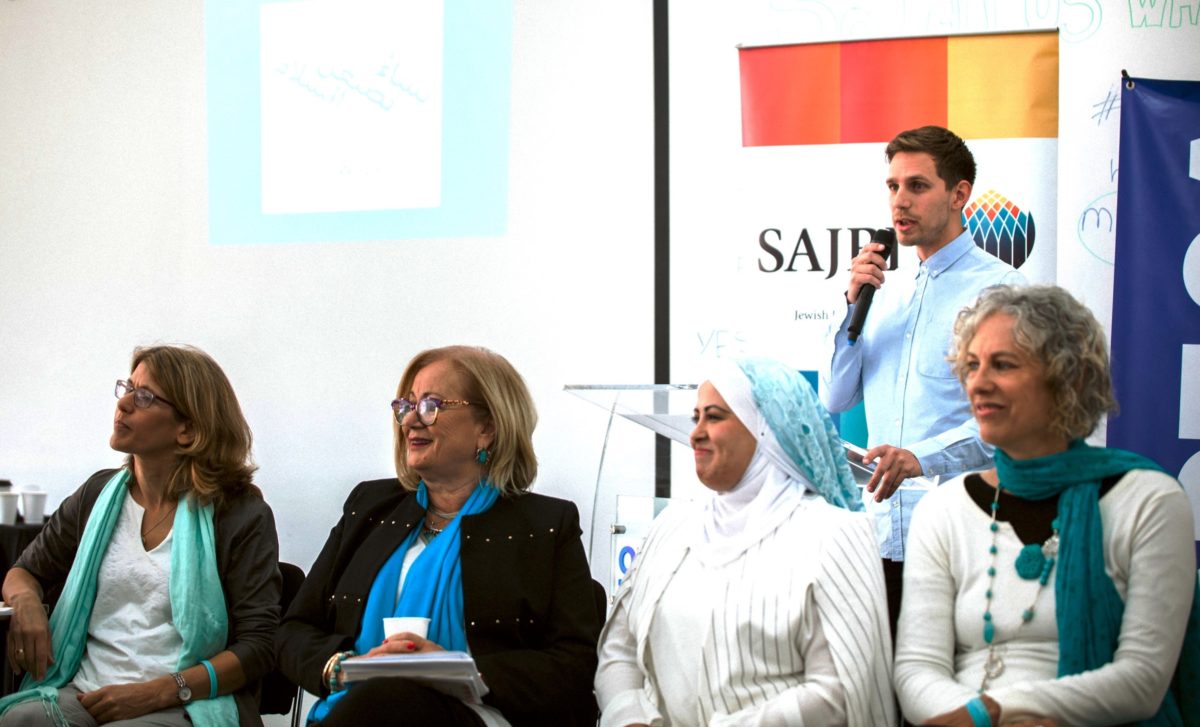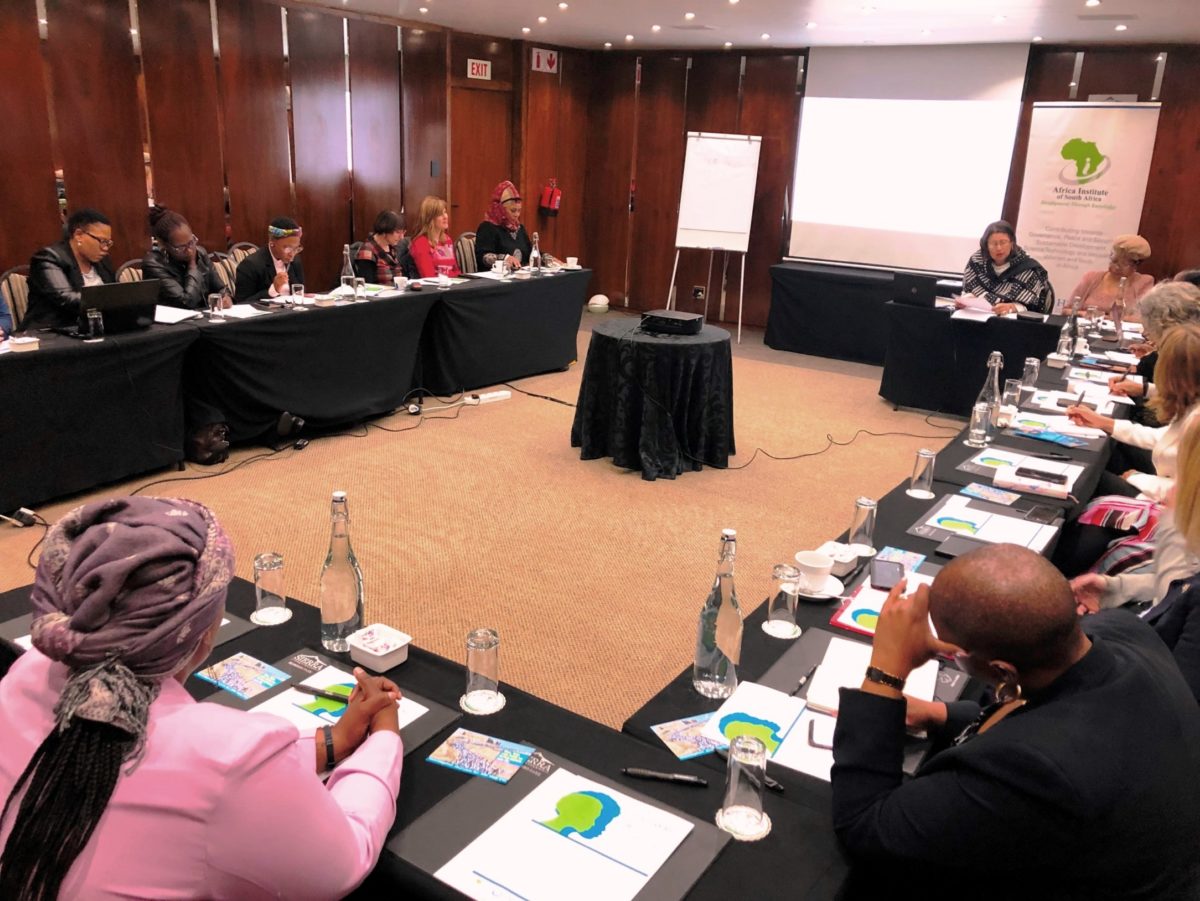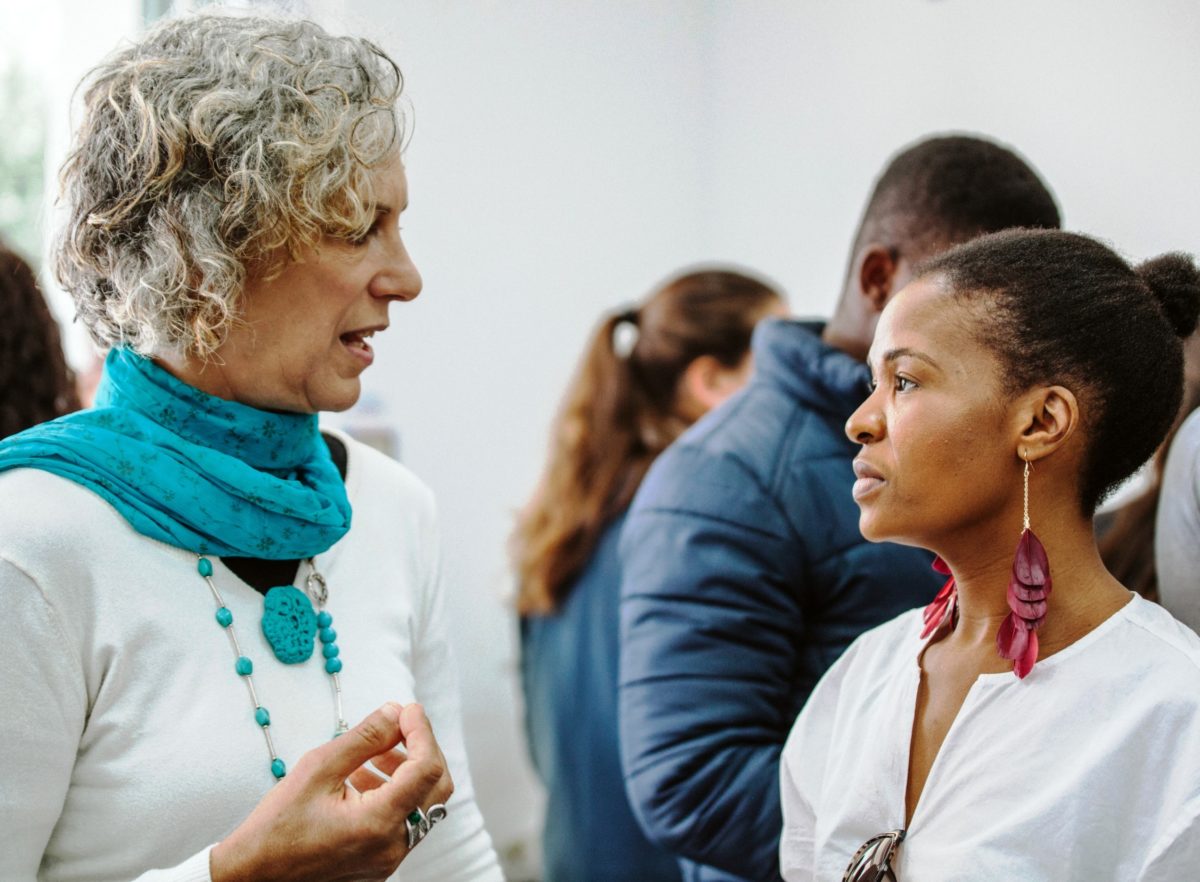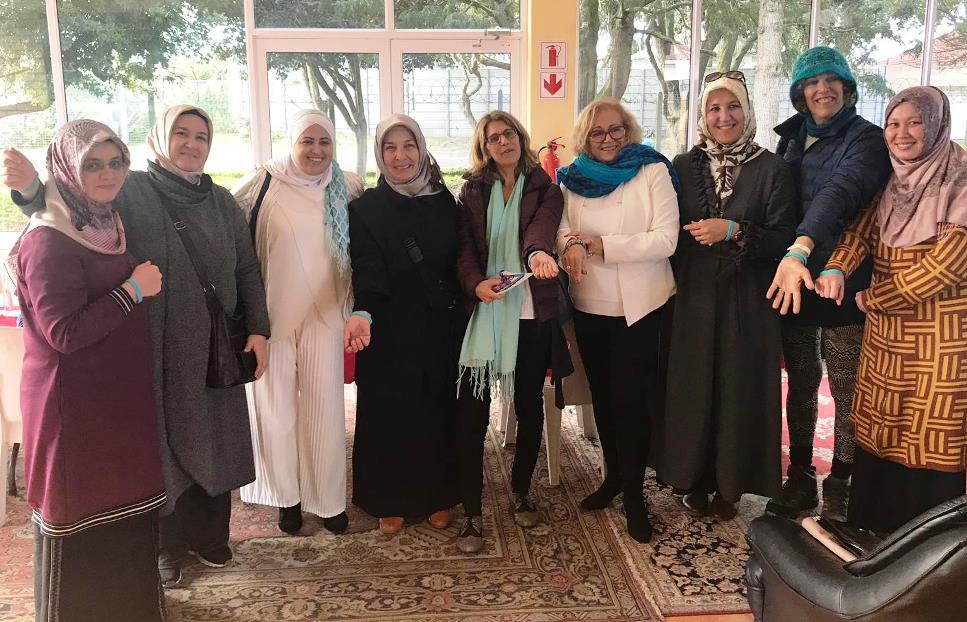Yanir Grindler is the Political Liaison officer at the SA Jewish Board of Deputies. He has an honours degree in Psychology from the University of Witwatersrand and, as a passionate mental health advocate, devotes time to counselling at a special needs school in the Johannesburg CBD. He is a former chairperson of the SA Union of Jewish Students at Wits, and won four student leader awards during his tenure.

The author introducing the Women Wage Peace delegation. From left, Yasmin Rubin-Cooper, Hyam Tannous, Manar Abu Dahl and Vered Eyal-Saldinger.
Coinciding with South Africa’s Women’s Month, the SA Jewish Board of Deputies recently hosted a delegation from the Israeli peace movement ‘Women Wage Peace’. Consisting of two Jewish, one Christian Arab and a Muslim Arab woman, the delegation engaged with government, civil society, academia, business, young people and the media, sharing their important messaging of peace-building through dialogue. Their visit, we believe, was an extraordinary success in terms of shifting the SA-Israeli narrative and how Israel is perceived in this country.
Who are Women Wage Peace?
WWP is a grassroots civil society movement founded in the aftermath of the 2014 Gaza conflict. Today it has over 40 000 members from across the religious, ethnic, social and political spectrum who come together to call for peaceful solutions, through monthly demonstrations, lobbying weekly in the Knesset and holding regular marches and campaigns throughout Israel. The movement is not affiliated with any political party. Its members include women from diverse communities within Israeli society: right, centre and left; religious and secular; Jews, Arabs, Druze and Bedouin; young women and older women; women from the centre of the country and from the periphery. The movement does not support any one particular solution to the conflict.
The movement has 2 main goals:
* To promote a political agreement as a strategic solution to the Israeli–Palestinian conflict.
* To include women in all aspects of decision making as mandated by UN Resolution 1325.
This resolution recognises that women are a key to promoting sustainable peace processes and ending violent conflict, and therefore, it is obligatory to include them in all aspects of decision making, especially regarding issues of peace and security.
Why the SAJBD chose to host them in South Africa.
The SAJBD brought out WWP to interact with people across a wide spectrum of racial, political, and religious backgrounds during Women’s month. It was strongly felt that their message of peace through dialogue rather than division and boycott was important for South Africans to hear. We also believe that South Africa is a model of justice and reconciliation through dialogue, and so the WWP message would strongly resonate with the local narrative. In just a few days, we believe that our guests significantly shifted the way Israel and its relationship with its neighbours is perceived in South Africa. By bringing out this delegation, we also wanted to show the common desire for peace among ordinary Israelis, despite the problems the country faces. The delegation comprised four women from diverse faith groups, all situated at different points on the political spectrum but bound together by a mutual commitment to bringing an end to the conflict. Each member of the delegation shared their own unique stories, challenges and reason for being part of the organisation.

‘Women in Dialogue’ engagement hosted by the Human Sciences Research Council.
Part of the movement's strength lies in its not being affiliated with any political party, and by the diversity of a membership drawn from a broad spectrum of Israeli society. This gave the SAJBD an opportunity to engage with a diversity of stakeholders, many whom we hadn’t been able to connect with previously. We divided the women’s programme into seven sections: engaging the youth, government, influential South African business people, civil society, academia, interfaith and the media. While the women were here, we also felt it necessary that they engaged in different aspects of the South African story. The lessons that they were able to draw from the South African experience wasn’t simply a personal exercise for members of the delegation, it also gave them the opportunity to elevate their level of engagement when interacting in different environments. By drawing lessons from our own history, they were able to speak directly to South Africans, contextualizing their important message within our unique context.
The programme
On the youth front, we used the opportunity to share a message of peace through dialogue to those often exposed to an opposing BDS message of polarization and boycott. We hosted three well-attended interactive discussions with the youth in Johannesburg and Cape Town, and further set up a more intimate meeting in which the WWP were able to personally interact with youth leaders of the ANC and EFF.

Women Wage Peace delegate Vered Eyal Saldinger engaging with Graca Lekola-Modiba at the youth event.
Together with influential businesswomen in the community, we co-hosted two hugely successful women’s month events with key women business leaders. We also met with key government officials, including members of the Department of International Relations and Cooperation (Dirco). This was indeed very encouraging. The theme of South African’s women’s month gave us the opportunity to engage with a number of stakeholders involved in the ‘Peace, Women and Security Agenda’. In Pretoria, the SAJBD co-hosted an intimate dialogue with Professor Cheryl Hendricks and the Human Sciences Research Council on the topic of Women’s role in peace-building. In attendance were leaders of UN Women, the SA Women in Dialogue, leaders from the National Interfaith Council of SA, the Commission of Gender Equality, the SA National Defence Force, the Zanele Mbeki Development Trust and other civil society leaders. Charlotte Lobe, the focal point of Women, Peace and Security from Dirco was also in attendance. Attendees were inspired and encouraged by the compassionate first-hand stories they heard, afterwards sharing contact details and committing to continue the engagement, bringing Israel into the South African conversation from a more nuanced direction.

Women Wage Peace delegates and Muslim women from the Turquoise Harmony Institute showing off their solidarity bracelets.
Of the four people in the delegation, Vered and Yasmin are Jewish, Manar is Muslim and Hyam is Christian. Given their diversity, we were able to engage in a number of interfaith spaces. In Johannesburg, we co-hosted an interfaith dialogue with the Gauteng Department of Sports, Arts, Culture and Recreation, at the Women’s Jail at Constitution Hill. The event was facilitated by the previous chairperson of the CRL Commission, Ms Thoko Mkwanazi-Xaluva and gave us the opportunity to engage with diverse interfaith women, many involved in South African civil society. The WWP also attended services at Church and at Shul. They were welcomed by the Impact for Christ Church in the Johannesburg CBD, where they spoke in front of 4000 passionate congregants. In Cape Town, we co-hosted an interfaith lunch with the Turquoise Harmony Institute, inviting the WWP and members of the Cape Town Muslim community. Finally, on the media front, the general level of engagement was encouraging. There was none of the hostility that visiting Israeli groups are so often confronted with. Rather, our visitors were received with enthusiasm and their key message of negotiation through dialogue rather than boycotting was warmly received.
The SAJBD thanks the generous donors who made it possible for us to host this remarkable group of women in our country.